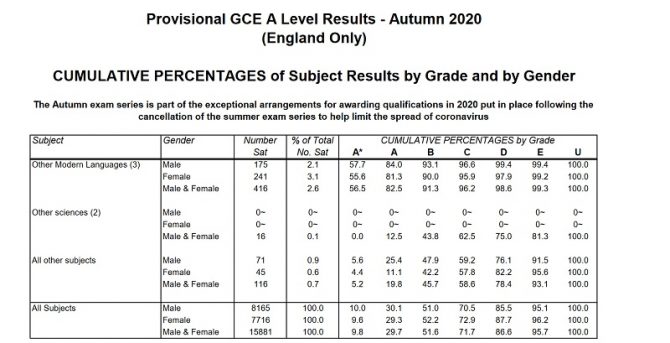The proportion of top grades awarded to students in the Autumn A-level exams is overall lower than the summer centre assessed grades, results published today show.
More than 15,000 students in England will get their results today after sitting exams between 5 and 23 October.
Students who received grade A and above in the Autumn resits series was 29.7 per cent compared to 38.1 in the summer.
However, this is still higher than the 2019 results where 25.2 per cent of students received A or above.
The number of students receiving A* was also higher than 2019, by 2.1 percentage points. However, it was 4.5 percentage points below those who received an A* in the summer.

In the summer, the proportion of A*s awarded to A-level pupils almost doubled.
The exams regulator Ofqual confirmed in October that pupils resitting qualifications this autumn would be handed the same “generosity” in their grades, as awarded in the summer.
The regulator added that the grade boundaries would be lowered for the exams. Results rocketed this summer after the government U-turn to award pupils with their CAG, or standardised grade if it was higher.
The percentage receiving C or above at A-level this Autumn was 71.7 per cent. In the summer this was 87.5 per cent and in 2019 it was 75.5 per cent.
In maths, which had the highest number of entries at 3,519, 29.6 per cent received A or above. This is a significant drop from 49.5 per cent in the summer and 40.5 per cent in 2019.
In English Literature, 35.7 per cent achieved an A or above. This is similar to the summer results, at 37.7 per cent but higher than the 2019 cohort, where 24.1 per cent achieved the top grades.
In chemistry, 29.3 per cent received an A or above, compared to 41.9 per cent in the summer. In 2019, this was similar to the Autumn results, at 28.4 per cent.
At AS level in England, 28.3 per cent achieved a grade A. This is similar to the summer results, at 27.1 per cent, but much higher than 2019 when 20.1 per cent were awarded the top grade.
Education secretary Gavin Williamson said: “Students getting their results today should feel incredibly proud of what they have achieved. The grades they receive today, just like the ones received by so many in the summer, can be their passport to the next stage of their lives.
“Fairness for students has always been and continues to be my priority, which is why we made sure young people could sit an exam this autumn and why we have set out such an exceptional set of measures for students sitting exams next year.”
